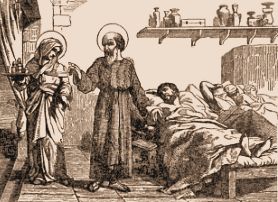Christmas: January 9th
Wednesday Christmas Weekday; Venerable Pauline-Marie Jaricot
» Enjoy our Liturgical Seasons series of e-books!
Old Calendar: Sts. Julian and Basilissa, martyrs (Hist)
In 1818 a young French lay woman, Pauline Marie Jaricot, founded the Association for the Propagation of the Faith, officially recognized on 3 May 1822. Pauline is "the foundress of the largest aid agency for the missions in the entire history of the Catholic Church," which later became the Society for the Propagation of the Faith and was conferred the title "Pontifical" by Pius XI in 1922. — Vatican website
She also was the foundress of the Association of the Living Rosary. She died on January 9, 1862 and was declared venerable on February 25, 1963. It is also the feast of Sts. Julian and Basilissa, husband and wife martyrs in the 4th century.
Christmas Weekday - Day Sixteen St. Francis initiated the beautiful practice of displaying a Christmas crib or creche. He built it in a cave on a bleak mountain near the village of Greccio. News of what he was doing spread all over the countryside and a steady stream of men, women and chldren came by night carrying torches and candles to light their way.
St. Francis initiated the beautiful practice of displaying a Christmas crib or creche. He built it in a cave on a bleak mountain near the village of Greccio. News of what he was doing spread all over the countryside and a steady stream of men, women and chldren came by night carrying torches and candles to light their way.
"It seemed like midday," wrote someone who was there, "during that midnight filled with gladness for man and beast, and the crowds drawing near, so happy to be present for the renewal of the eternal mystery." Francis himself sang the Gospel story in a voice which was "strong and sweet and clear," says the observer. "Then he preached to the people, most movingly, about the birth of the poor King in little Bethlehem." — Excerpted from Christmas
- Day Sixteen activity (St. Francis and the Creche)
- Day Sixteen recipe (Double Chocolate Mocha Biscotti)
Venerable Pauline-Marie Jaricot
Pauline Marie Jaricot was born to a very pious Catholic family in Lyons, France, July 22, 1799, and grew up dreaming of becoming a great missionary. Through her brother she developed a real concern for the Asian missions, and at age 17, she began to lead a life of unusual abnegation and self-sacrifice, and on Christmas Day, 1816, took a vow of perpetual virginity. At age 18, she composed a treatise on the Infinite Love of the Divine Eucharist.
In order to repair the sins of neglect and ingratitude committed against the Sacred Heart of Jesus, she established a union of prayer among pious servant girls, the members of which were known as the "Réparatrices du Sacré-Coeur de Jésus-Christ."
During an extended visit to her married sister at Saint-Vallier (Drôme), she succeeded in effecting a complete transformation in the licentious lives of the numerous girls employed by her brother-in-law. It was among them and the "Réparatrices" that she first solicited offerings for the foreign missions. Her systematic organization of such collections dates back to 1819 when she asked each of her intimate friends to act as a promoter by finding ten associates willing to contribute one cent each week to the propagation of the Faith. One out of every ten promoters gathered the collections of their fellow-promoters; through a logical extension of this system, all the offerings were ultimately remitted to one central treasurer. The Society for the Propagation of Faith at its official foundation (3 May 1822) adopted this method, and easily triumphed over the opposition which had sought from the very start to thwart the realization of Pauline Jaricot's plans.
In 1826 she founded the Association of the Living Rosary. The fifteen decades of the Rosary were divided among fifteen associates, each of whom had to recite daily only one determined decade. A second object of the new foundation was the spread of good books and articles of piety. An undertaking of Pauline's in the interest of social reform, though begun with prudence, involved her in considerable financial difficulties and ended in failure. She died on January 9, 1862 and was declared venerable on February 25, 1963.
Patron: Against poverty; impoverishment; poverty.
Things to Do:
- Read more about Pauline-Marie Jaricot here and here.
- Read the Letter written by Pope John Paul II for the bicentenary of the birth of Ven. Pauline-Marie Jaricot.
- Learn more about The Society for the Propagation of the Faith.
- Have your children offer extra prayers for the missions or make a small sacrifice for priests and nuns in mission countries.
Sts. Julian and Basilissa St. Julian and St. Basilissa, though married, lived, by mutual consent, in perpetual chastity; they sanctified themselves by the most perfect exercises of an ascetic life, and employed their revenues in relieving the poor and the sick. For this purpose they converted their house into a kind of hospital, in which they sometimes entertained a thousand poor people. Basilissa attended those of her sex, in separate lodgings from the men; these were taken care of by Julian, who from his charity is named the Hospitalarian. Egypt, where they lived, had then begun to abound with examples of persons who, either in the cities or in the deserts, devoted themselves to the most perfect exercises of charity, penance, and mortification.
St. Julian and St. Basilissa, though married, lived, by mutual consent, in perpetual chastity; they sanctified themselves by the most perfect exercises of an ascetic life, and employed their revenues in relieving the poor and the sick. For this purpose they converted their house into a kind of hospital, in which they sometimes entertained a thousand poor people. Basilissa attended those of her sex, in separate lodgings from the men; these were taken care of by Julian, who from his charity is named the Hospitalarian. Egypt, where they lived, had then begun to abound with examples of persons who, either in the cities or in the deserts, devoted themselves to the most perfect exercises of charity, penance, and mortification.
Basilissa, after having stood seven persecutions, died in peace; Julian survived her many years and received the crown of a glorious martyrdom, together with Celsus, a youth, Antony, a priest, Anastasius, and Marcianilla, the mother of Celsus.
Many churches and hospitals in the East, and especially in the West, bear the name of one or other of these martyrs. Four churches at Rome, and three out of five at Paris, which bear the name of St. Julian, were originally dedicated under the name of St. Julian, the Hospitalarian and martyr.
In the time of St. Gregory the Great, the skull of St. Julian was brought out of the East into France, and given to Queen Brunehault; she gave it to the nunnery which she founded at Étampes; part of it is at present in the monastery of Morigny, near Étampes, and part in the church of the regular canonesses of St. Basilissa at Paris.
Excerpted from Lives of the Saints, by Alban Butler, Benziger Bros. ed. [1894]
